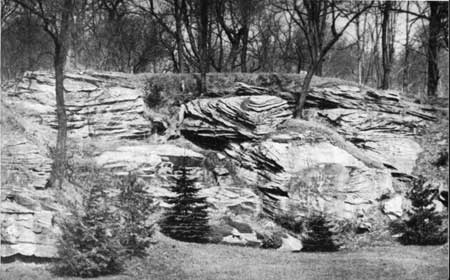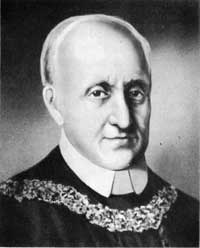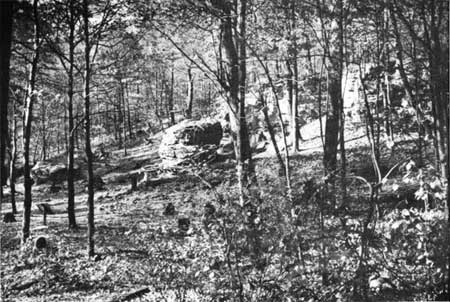|
FORT NECESSITY National Battlefield |
 |

Half King's Rocks on Chestnut Ridge, where Washington and the Half
King planned the attack on Jumonville.
The Fort Necessity Campaign (continued)
THE JUMONVILLE INCIDENT. Events now moved speedily. In the evening of May 27, a runner from the Half King arrived at Great Meadows with the news that the hiding place of a body of French had been discovered on Chestnut Ridge, 5 miles westward. The Half King had discovered the trail of two men and had followed it to a deep ravine in the forest. Fearing that the French were about to attack him, Washington determined at once to dispose of this threat. He left a strong guard to protect the fort and its stores of ammunition from a surprise attack and set out with about 40 men in a night "as dark as pitch, along a path scarce broad enough for one man."
 Capt. Louis Coulon de Villiers. Courtesy Pennsylvania Historical and Museum Commission. |
Stumbling along the mountain path in the inky darkness of the forest and in a heavy rain, frequently losing their way, the party at dawn reached the Indian camp at Half King's Rocks on the crest of Chestnut Ridge. Here, Washington and the Half King decided to attack the French in their hideout at once. Indian scouts led the way 2 miles northward. The party was soon in the presence of the enemy who were encamped in a secret glen sheltered by a 30-foot ledge of rocks. Washington at first hoped to encircle the French party, but was discovered. Immediately, the Virginians and their Indian allies, who now moved cautiously to the east bank, poured a brisk and galling fire into the French. Within 15 minutes, the firing ceased. The French leader, Ensign Joseph Coulon de Villiers, Sieur de Jumonville, and 9 of his men were killed, 1 was wounded, 21 were captured, and 1 succeeded in getting away. One of Washington's men was killed. The lone French survivor made his way back to Fort Duquesne and related to Contrecoeur the fate of Jumonville and his men. Among the prisoners, probably the one most highly prized by the Virginians was Commissary La Force. Described by Washington as "a bold, enterprising man and a person of great subtlety and cunning," La Force, with a detachment of 50 men, had for weeks closely followed Washington's movements.
The Jumonville incident had immediate and far-reaching repercussions. The act was denounced throughout Europe as the "assassination" of Jumonville while he was proceeding to Washington's encampment with a message from the French commander at Fort Duquesne. Washington answered the accusation pointedly in his letter to Governor Dinwiddie in which he stated that ". . . instead of coming as an Embassador, publicly, and in an open manner, they came secretly, and sought after the most hidden retreats . . . encamped there and remained hidden for whole days together, at a distance of not more than five miles from us; they sent spies to reconnoiter our camp . . ."

Jumonville Glen.
Responding to the allegation that the French party, when attacked, was on a mission of peace, Washington wrote "They say they called us as soon as they had discovered us; which is an absolute falsehood for I was then marching at the head of the company going toward them and can positively affirm that, when they saw us, they ran to their arms, without calling; as I must have heard them had they so done." Duquesne, on hearing of Jumonville's death, branded it assassination and wrote Contrecoeur that if the English were marching toward Fort Duquesne "with an open show of force, as you have been informed, the break is definite and you will overlook nothing in repelling force with force."
The outcome of the action on Chestnut Ridge was decisive. Washington realized, however, that a strong enemy force might soon fall upon him. Aware of this peril and anticipating French reprisals, he sent a message to Colonel Fry at Wills Creek for reinforcements. The returning messenger informed Washington that Fry had been fatally injured in a fall from his horse, and that the command had devolved upon Col. James Innes, who had recently arrived with his regiment of North Carolina troops. Two New York companies were still at Alexandria, Va., when the French fell upon Washington at Fort Necessity and did not reach Wills Creek until the remnants of Washington's broken little force were returning to the shelter of that fort. Colonel Washington now was given command of the Virginia regiment.

|
|
Last Modified: Mon, Dec 2 2002 10:00:00 am PDT |


